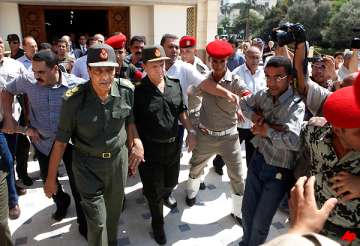New Outcry Erupts In Egypt Against Military Rulers
Cairo, Nov 3: Egypt's military rulers have triggered a new public outcry with a proposal that critics see as an attempt to enshrine a supreme political role for themselves in the new constitution.The furor is

Cairo, Nov 3: Egypt's military rulers have triggered a new public outcry with a proposal that critics see as an attempt to enshrine a supreme political role for themselves in the new constitution.
The furor is over a new government-sponsored proposal of overarching principles that would guide the drafting of a new constitution. The proposal only requires adoption by the Supreme Council of the Armed Forces to make it binding.
If approved, the measure would shield the military from parliamentary oversight, give it a veto over legislation dealing with its affairs and reduce the powers of parliament to select a panel to write the constitution.
The proposal also would declare the armed forces the protector of “constitutional legitimacy,” wording that is widely interpreted to mean giving the military final say over major policies.
Egypt's best known reform proponent, Mohamed ElBaradei, described the document as “distorted” and demanded its withdrawal.
“There is a difference between a civilian democratic state that guarantees man's basic rights and military guardianship.”
The Islamic fundamentalist Muslim Brotherhood, the country's largest and most powerful political group, is leading the opposition to the document, saying it “raped people's will.”
“This route goes against the will of the people, and will lead to another revolution,” said Saad el-Katatni, spokesman of the Brotherhood's Freedom and Justice party. “We call on the people of Egypt to reject the document to protect their rights.”
Critics say the document would create a military state-within-the-state and devalue the democratic system the military vowed to install when it took over after Hosni Mubarak was ousted in February in a popular uprising.
The uproar over the draft, which dominated the nation's press Thursday, has deepened tension between political activists and rights groups and the military ahead of this month's key parliamentary elections. It came after the arrest earlier this week by the military of one of Egypt's best known bloggers and activists for his alleged role in sectarian clashes on Oct. 9 in which 27 people, mostly Christians, were killed and hundreds wounded.
Alaa Abdel-Fattah's arrest sent shock waves through the community of activists and pro-reform groups behind Mubarak's ouster. They said the move showed a systematic campaign to discredit them as the generals build their own image as the nation's foremost patriots.
The Oct. 9 violence was the worst since Mubarak's ouster and the controversy over who to blame for the bloodshed has signaled a new low in relations between the military and activists, who blame troops for starting the violence and army vehicles of running over protesters. The military denies the charge, insisting that troops deployed to deal with a Christian protest on the day had no ammunition or firearms.
A report Wednesday by the state National Council for Human Rights confirmed earlier witness and hospital reports that 12 of those killed were run over by army vehicles and that troops fired blanks at the protesters. It blames a group of unidentified civilians for the shooting death of protesters and soldiers at the scene.
It also called for a criminal probe into the coverage of the incident by state television, which broadcast calls for “honorable” Egyptians to rush to the rescue of the army, a move that brought armed civilians out on the streets assaulting Christians with firebombs, knifes and clubs.
The constitutional proposal, meanwhile, is widely thought to have been drafted at the behest of the military, which has dominated Egypt since officers seized power in a 1952 coup. All of Egypt's four presidents have since hailed from the military and most of the top jobs at strategically located provinces, regional councils and state organizations are filled by retired generals.
Many activists see the document as an attempt by the military to retain power after parliamentary and presidential elections are held. Presidential elections are initially slated for late next year or early in 2013.
They say the military is hoping to create conditions on the ground that allow it to retain real power even after the country has an elected legislature, a new constitution and a civilian president.
The proposal says 80 of the 100-member panel to be mandated to write the new constitution will not be members of parliament's two chambers and will instead be drawn from a wide range of institutions, including the judiciary, universities and civil society groups. The rest will come from political groups represented in parliament's two chambers.
It gives the military the right to veto the draft constitution if it contravenes the guidelines set in Deputy Prime Minister Ali al-Salmy's proposal. If the 100-member panel rejects the military's complaint, the dispute will be referred to the Supreme Constitutional Court, whose ruling would be binding.
Islamists are expected to dominate parliament after the Nov. 28 election, and the proposal is designed at least in part to deny them too much influence on the constitution.
“Our position is to confront any attempt to suppress people's will,” presidential hopeful Mohammed Salim al-Awaa said, threatening a series of demonstrations against the proposal.
“This document is an attempt to take away the power of the next parliament and impose a mandate by the (military) council.”